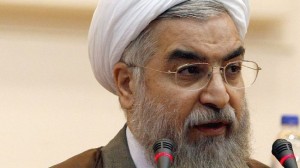 BEIRUT�Iran's President-elect Hasan Rouhani, after winning office with an unexpected level of popular support, will put his political pull to the test in the coming weeks with the appointment of a cabinet lineup that could anger his foes.
BEIRUT�Iran's President-elect Hasan Rouhani, after winning office with an unexpected level of popular support, will put his political pull to the test in the coming weeks with the appointment of a cabinet lineup that could anger his foes.Mr. Rouhani, who takes office in early August, has promised to deliver a balanced government that draws from technocrats and former officials from reformist political factions and the conservatives who were trounced in elections a month ago.
Iran's conservative parties have regrouped to debate how to overcome their low popularity and perceived policy failures. They have also criticized an initial list of potential cabinet nominations leaked to the media that would put reformists, who support moderate policies and a more open society, back into decision-making roles.
In a system in which each nominated cabinet member must get parliamentary approval, some conservative legislators openly warned this week that they could block nominations.
Iran's political structure is one of parallel rule�meaning elected officials such as Mr. Rouhani are supervised and could be overruled by Supreme Leader Ayatollah Ali Khamenei or clerical committees that he has had a hand in appointing.
Conservatives could sway Mr. Khamenei and many influential clerics on these committees�in a way that ultimately impedes or prevents Mr. Rouhani from making meaningful changes that the public elected him to make. On top of the list is resolving Iran's nuclear standoff with the West, to remove the sanctions hurting the economy.
But Mr. Rouhani also has clout, along with widespread popular support. He is considered a close friend and confidant of Mr. Khamenei and could push back by claiming that conservative candidates, who opposed changes to foreign, nuclear and economic policies, failed to win elections.
"He will probably succeed in naming a different cabinet that will include reformists. Of course, he has to gain the full approval of Mr. Khamenei," said Roozbeh Mirebrahimi, a New York-based independent expert on Iran.
The president-elect has begun closed-door negotiations on forming a cabinet, and is consulting with an advisory committee that includes former Presidents Mohamad Khatami and Ali Akbar Rafsanjani, Iranian media reported.
One way to gauge Mr. Rouhani's commitment to policy changes will be the appointments he makes to the intelligence, interior and foreign ministries. Ministers with track records of moderate and pragmatic policies, as opposed to the ideological appointments of recent years, could eventually pave the way for policy shifts.
Some prominent conservative politicians have told Iranian media that they would reject candidates with ties to the opposition Green Movement or those who supported the antigovernment 2009 uprisings.
When Mr. Khatami publicly suggested last week a candidate to lead the ministry of culture�a major post on matters of social freedoms�some conservative editorials said reformists were trying to "hijack" the next government.
Reformists and Green Movement supporters take credit for helping elect Mr. Rouhani and say it is only fair that they are now given a share of the pie.
"Reformists are a political faction that won in this election. What reason is there to exclude them from the government?" said Hossein Marashi, a reformist politician.
Some conservatives have blamed the election loss on their own focus on ideology and lack of understanding of social dynamics shaping Iran today. Others have said divisions and infighting among conservative factions were to blame.
The conservative parties even did poorly in the election of the highly politicized and influential Tehran city council, a conservative bastion for the past eight years. Candidates from President Mahmoud Ahmadinejad's group, including his sister, all lost, and other conservative parties lost half of their seats to reformist candidates on the 31-member council.
A prominent conservative columnist and pundit, Amir Mohebian, said after the election that the conservatives' biggest mistake was linking itself so closely with the regime, which is centered on Mr. Khamenei, the Revolutionary Guard Corps and senior clerics. He acknowledged that the public appeared set on rejecting the candidates perceived as closest to the regime.
Mr. Mohebian suggested in an interview with the Fars News Agency that in order for conservatives to safeguard the regime they need to show more flexibility on some of their principal beliefs.
"Most conservatives see the society through the prism of the regime. We don't pay enough attention to society. We think if we cave in then everything will collapse," he said.
By The Wall Street Journal
The Iran Project is not responsible for the content of quoted articles.










